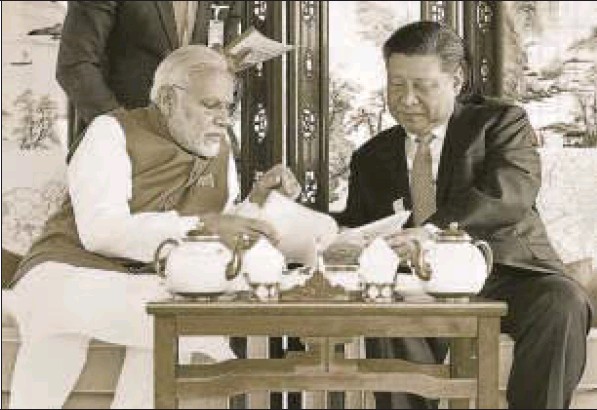- Delhi-Beijing Aligning Can Work To Kabul’s Advantage



Harsh V Pant
Central Asia will greatly benefit if the economic interests of the Asian giants were to coincide in Afghanistan
The volatility of the security situation in Afghanistan was once again highlighted on May 31 when more 50 people died in a coordinated double suicide bombing in Kabul and a shooting in the eastern Khost province. The Taliban and Islamic State are now competing with each other, and, in the process, the level of destruction is reaching unprecedented levels.
PTIPrime Minister Narendra Modi with Chinese President Xi Jinping in a house boat, East Lake, Wuhan, China, April 28
The attacks are also symbolic of the growing capacity issues facing the country. Less than 60% of Afghanistan is now being controlled by the government forces and as per the latest report of the Special Inspector General for Afghanistan Reconstruction, the Afghan army and police have 36,000 fewer personnel today than they did last year as a result of desertions and casualties. Recognising its limitations, Afghan President Ashraf Ghani made an effort in February to restart the peace process by offering to recognise the Taliban as a legitimate political group. But the Taliban want direct talks with the United States.
Now, enter China and India with their talk of a joint economic project in Afghanistan. This was reportedly decided at the informal summit in Wuhan on April 27-28 between Prime Minister Narendra Modi and Chinese President Xi Jinping. If this gets operationalised, it could reshape the geopolitics in and around Afghanistan.
Despite some initial optimism that India and China would find it easy to cooperate in Afghanistan given their shared concerns regarding terrorism, the two nations have been struggling to move forward.
Pakistan has single-handedly wrecked all serious efforts at finding a sustainable solution to lasting peace in Afghanistan. Now with the Belt and Road Initiative being Xi’s pet project and India opposing the China-pakistan Economic Corridor (CPEC), new ways for engagement are being found. A joint project in Afghanistan will unsettle Pakistan which has been discussing with China the possibility of extending CPEC to Afghanistan.
India-afghan ties’ upward trajectory is underscored by the activation of the India-afghanistan air corridor and the finalisation of a trilateral agreement with Iran over the Chabahar port.
Indian workers
From page 01 A security official who did not wish to be named said Indians working on infrastructure projects in Afghanistan have been advised to take precaution and use different routes and travel times to make it difficult for anyone to monitor their activities.
They have also been asked to avoid non-essential travel outside urban areas and use security escorts whenever they travel outside major cities there, the official added.
Harsh V Pant is professor, King’s College London and distinguished fellow, Observer Research Foundation The views expressed are personal
Courtesy: Hindustan Times: 7 May 2018


